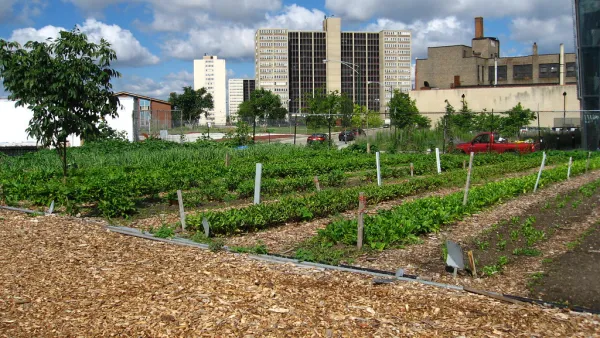This column looks at President-elect Barack Obama's food politics and wonders just how sustainable his administration's food policies will be.
"Obama has raised hopes he will inspire Americans away from fool's gold-en arches and toward farmers markets and community supported agriculture (where people buy a share in a farm's annual harvest). Obama is the most healthy eater to enter the White House in a long time, unlike George H.W. Bush who castigated broccoli as he craved pork rinds, unlike ravenous Bill Clinton, who gained 30 pounds in his first presidential campaign, and unlike the junior George W. Bush, who, pun intended, butchered the meat of his message on food. He once said, 'I know how hard it is for you to put food on your family.'"
"Obama purchased peaches, pears, apples and nectarines from farmers markets on the campaign trail. Grass-roots organizing in farmers markets helped him turn Indiana from a red state to a blue state and cruise to victory in Wisconsin. Physician Rob Stone told the Los Angeles Times, 'Obama's played Bloomington like a violin. Last summer, his people put out a table at the local farmers market and they've been showing up every weekend.'"
"Obama's nomination of former Iowa governor Tom Vilsack for Agriculture secretary further leaves unclear if he has a food strategy. Vilsack is a relatively open-minded farm-belt politician on alternative energy. But Monsanto's vice president of global plant breeding, Ted Crosbie, said Vilsack has 'a very balanced view of agriculture.'"
"The problem is that agribusiness is grossly unbalanced, flooding Capitol Hill with $1 billion of lobbying efforts the last 11 years, according to the Center for Responsive Politics, reaping $177 billion in subsidies the last 12, according to the Environmental Working Group. There is so little accountability in farm payment programs that the Government Accountability Office reported in October that the United States Department of Agriculture paid out a total of $49 million to 2,702 potentially ineligible people whose adjusted gross income was more than $2.5 million and derived less than 75 percent of their income from farming, ranching, or forestry."
FULL STORY: Is a sustainable food strategy on Obama's menu?

Analysis: Cybertruck Fatality Rate Far Exceeds That of Ford Pinto
The Tesla Cybertruck was recalled seven times last year.

National Parks Layoffs Will Cause Communities to Lose Billions
Thousands of essential park workers were laid off this week, just before the busy spring break season.

Retro-silient?: America’s First “Eco-burb,” The Woodlands Turns 50
A master-planned community north of Houston offers lessons on green infrastructure and resilient design, but falls short of its founder’s lofty affordability and walkability goals.

Test News Post 1
This is a summary

Analysis: Cybertruck Fatality Rate Far Exceeds That of Ford Pinto
The Tesla Cybertruck was recalled seven times last year.

Test News Headline 46
Test for the image on the front page.
Urban Design for Planners 1: Software Tools
This six-course series explores essential urban design concepts using open source software and equips planners with the tools they need to participate fully in the urban design process.
Planning for Universal Design
Learn the tools for implementing Universal Design in planning regulations.
EMC Planning Group, Inc.
Planetizen
Planetizen
Mpact (formerly Rail~Volution)
Great Falls Development Authority, Inc.
HUDs Office of Policy Development and Research
NYU Wagner Graduate School of Public Service


























